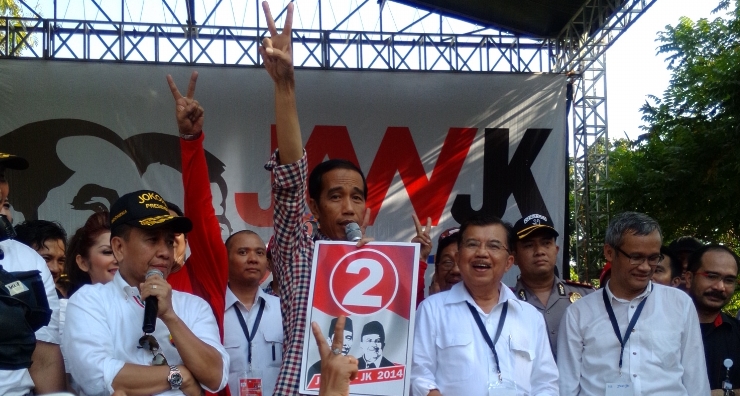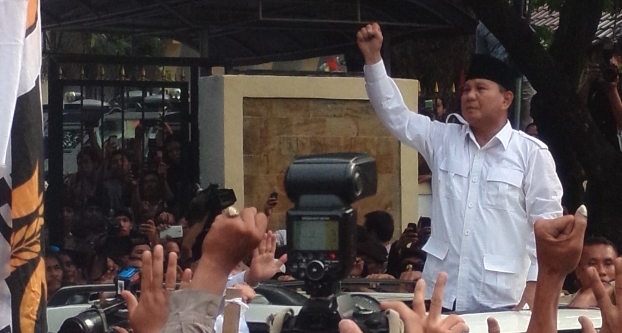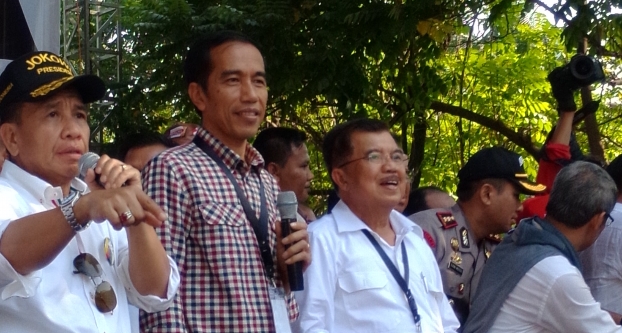Driving commercial and political engagement between Asia, the Middle East and Europe
Driving commercial and political engagement between Asia, the Middle East and Europe
Driving commercial and political engagement between Asia, the Middle East and Europe

After a long-fought battle, finally Joko Widodo (commonly know as Jokowi) and his running mate Jusuf Kalla have won the 2014 presidential election.
According to the General Election Commission (KPU), the pair secured almost 71 million votes (53.15 per cent of the total votes), while their opponent Prabowo Subianto and his running mate vice presidential candidate Hatta Rajasa received only 62.5 million votes (46.85 per cent of the total votes).
The real count confirmed the earlier quick count results by a number of well-respected pollsters. However, Prabowo and Hatta Rajasa have refuted the results by arguing that the election process was riddled with fraud and violations and they are challenging the results in Indonesia’s Constitutional Court (Mahkamah Konstitusi). The first hearing is scheduled for this Wednesday, 6 August. The Court is expected to announce its verdict on 22 August 2014 and there can be no appeal.
Jokowi is set to be inaugurated at the People’s Consultative Assembly on 20 October, ending the 10-year term of outgoing President Susilo Bambang Yudhoyono.
Before Jokowi assumes the presidential office, there are four critical issues to resolve immediately, namely: promoting national reconciliation, securing more support in Parliament, selecting his members of cabinet, and ensuring a smooth transition from Yudhoyono.
Four Immediate Critical Issues
Firstly, Jokowi and Kalla must reunite a nation that has been polarised in the past two months. This election has divided the nation intro three groups: Jokowi’s supporters, Prabowo’s supporters, and those skeptical of both candidates. Jokowi must assure Prabowo’s supporters and the skeptics that he can be trusted and he will not discriminate against them. Resolving this issue is important for two reasons. First, reuniting the nation will prevent Indonesia from a post-election conflict that has been predicted by a number of political analysts. In doing so, Jokowi can secure sufficient legitimacy to run the country for the next five years.
Jokowi has explicitly stated in his victory speech that this is the time for the nation to reunite. He also added that his victory is also the nation’s victory and asked supporters from both camps to leave the mood of competition behind. Nevertheless, based on observations in social media, many of Prabowo’s supporters seem reluctant to accept the defeat. They still believe that the vote counting process is fraudulent and the result is unconstitutional. Jokowi will need more time to assure Prabowo’s supporters that he is the right leader to lead the country. It is not going to be easy for Jokowi to achieve this objective.

Prabowo Subianto. Photo by Yoes C. Kenawas
Secondly, Jokowi must also try to open a channel of communication with political parties that support Prabowo in order to secure his policy plans in Parliament. Jokowi’s current coalition of parties is not enough to win the majority of votes in the House of People’s Representatives (Indonesia’s lower house of parliament). It can only secure 207 seats in the 560-seat House of Representatives (DPR), while Prabowo’s camp has 353 seats. If Jokowi fails to win enough support from the members of parliament, then we may see a deadlock in the future. Consequently, Jokowi would not be able to perform effectively because there would always be a risk that Parliament could block his initiatives.
The risk is more visible when we take into account the newly-signed revision of the controversial Legislative Institution Law (known as MD3). The law will significantly reduce the influence of Jokowi’s party, the Indonesian Democratic Party of Struggle (PDIP), and its coalition in the lower house of parliament. For instance, it alters the traditional mechanism for selecting the Speaker of the House of Representatives. Previously, the position of House Speaker was automatically given to the political party that secured the largest number of votes in the legislative election. (In the legislative elections held in April 2014 for example PDIP came top with 18.95 per cent of the vote). With the new regulation, the Speaker will be selected through a parliamentary vote. The law is advantageous only to the coalition that supports Prabowo and Hatta, because this camp has more seats in the current parliament than Jokowi’s coalition.
Thirdly, Jokowi and Kalla must select their members of cabinet carefully. Jokowi and Kalla once promised that they would never engage in horse-trading politics and would select the best sons and daughters of Indonesia to fill the cabinet portfolio. Their choice will be critical if Jokowi wants to maintain public support for the next five years. The key is how Jokowi can find a balance between, on the one hand, his determination to fulfill his promise and, on the other hand, the interests of those who supported him during the election: the coalition and the oligarchs. It is logical that Jokowi may want to give a small portion of ministerial positions to the parties’ representatives. Nevertheless, a cabinet of ministers who come from various professional backgrounds will greatly help Jokowi to build his credibility in the eyes of his supporters.
Fourthly, Jokowi must work closely with the Office of the President to ensure a smooth transition. In the past 10 years, President Yudhoyono has made significant contributions to the country’s development. Some of President Yudhoyono’s legacies include stability of economic growth, a good national image in the eyes of the international community, and a strong commitment to democracy. Inevitably, Jokowi must admit these achievements and be committed to continue the legacies as well as learning from the Yudhoyono administration’s shortcomings. The best source for Jokowi to get insights about some obstacles in the past administration is Yudhoyono himself. By developing good communication with Yudhoyono, Jokowi will not only receive invaluable insights about the existing problems but also can start to build a stronger foundation for potential parliamentary support. This stronger foundation would be possible because Yudhoyono is the Chairman of the Democratic Party (PD) which controls 61 seats in the parliament.
Challenges Ahead
Jokowi must also overcome various crucial issues once he has been sworn in in October and these include fulfilling his campaign promises, maintaining his current level of public approval, getting more support in Parliament and controlling his party’s behaviour.
His honeymoon period will come to an end when he steps into the Presidential Palace. The people will want to see immediate reform and his real actions in solving the country’s problems, such as poor infrastructure, ineffective bureaucracy, corruption, and many more issues. On the political front, Jokowi must also ensure that he can maintain his current level of public approval and the support of parliament.

Joko Widodo. Photo by Yoes C. Kenawas
These two issues became problems during Yudhoyono’s presidency. On many occasions, Yudhoyono and his ministers had to defend themselves against criticisms from parliament. Therefore, Jokowi and Kalla must find a way to tame parliament while, at the same time, maintaining their reputation as pro-people leaders.
Another challenge for Jokowi is how he can control his own party’s behaviour. During Yudhoyono’s administration, the Democratic Party (known as PD in Indonesian) apparatus made many mistakes, such as commenting incorrectly on sensitive issues, a PD politician being arrested by the Corruption Eradication Commission (known as KPK in Indonesian), and engaging in an internal rift that tainted not only the party’s image but also the president’s reputation. The key is how Jokowi can cooperate with central figures in PDIP such as Megawati Soekarnoputri, its chairwoman and her daughter Puan Maharani, while at the same time avoid being perceived as their puppet. This is a vital issue for Jokowi in his effort to maintain legitimacy over the next five years.
Yoes C. Kenawas is an Indonesian national and the 2014 Arryman Fellow at Northwestern University, Evanston, IL, United States. He can be reached at yoes.kenawas@gmail.com and be found tweeting @yoskenawas. His research topics include political dynasties and oligarchy in Indonesia; state, society and politics in Indonesia; comparative politics; particularly government and politics in Southeast Asia; democratisation, particularly the party institutionalization and elections; and political marketing, media and politics.
This is one of a series of exclusive stories we are carrying on the Indonesian presidential election 2014, the results of which were announced in July. To read the other stories, click here.
